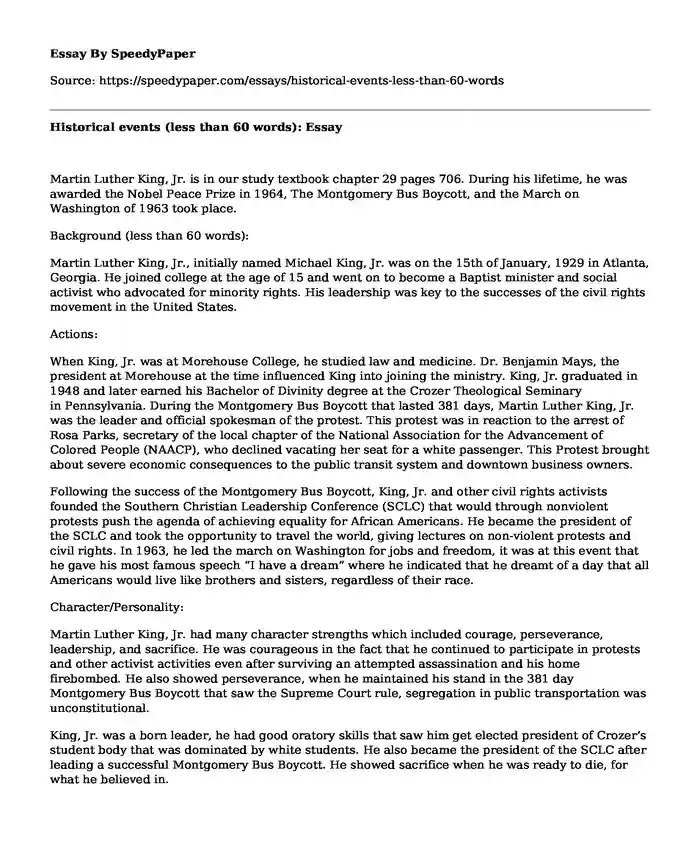
| Type of paper: | Essay |
| Categories: | Business Research Government |
| Pages: | 3 |
| Wordcount: | 660 words |
Martin Luther King, Jr. is in our study textbook chapter 29 pages 706. During his lifetime, he was awarded the Nobel Peace Prize in 1964, The Montgomery Bus Boycott, and the March on Washington of 1963 took place.
Background (less than 60 words):
Martin Luther King, Jr., initially named Michael King, Jr. was on the 15th of January, 1929 in Atlanta, Georgia. He joined college at the age of 15 and went on to become a Baptist minister and social activist who advocated for minority rights. His leadership was key to the successes of the civil rights movement in the United States.
Actions:
When King, Jr. was at Morehouse College, he studied law and medicine. Dr. Benjamin Mays, the president at Morehouse at the time influenced King into joining the ministry. King, Jr. graduated in 1948 and later earned his Bachelor of Divinity degree at the Crozer Theological Seminary in Pennsylvania. During the Montgomery Bus Boycott that lasted 381 days, Martin Luther King, Jr. was the leader and official spokesman of the protest. This protest was in reaction to the arrest of Rosa Parks, secretary of the local chapter of the National Association for the Advancement of Colored People (NAACP), who declined vacating her seat for a white passenger. This Protest brought about severe economic consequences to the public transit system and downtown business owners.
Following the success of the Montgomery Bus Boycott, King, Jr. and other civil rights activists founded the Southern Christian Leadership Conference (SCLC) that would through nonviolent protests push the agenda of achieving equality for African Americans. He became the president of the SCLC and took the opportunity to travel the world, giving lectures on non-violent protests and civil rights. In 1963, he led the march on Washington for jobs and freedom, it was at this event that he gave his most famous speech "I have a dream" where he indicated that he dreamt of a day that all Americans would live like brothers and sisters, regardless of their race.
Character/Personality:
Martin Luther King, Jr. had many character strengths which included courage, perseverance, leadership, and sacrifice. He was courageous in the fact that he continued to participate in protests and other activist activities even after surviving an attempted assassination and his home firebombed. He also showed perseverance, when he maintained his stand in the 381 day Montgomery Bus Boycott that saw the Supreme Court rule, segregation in public transportation was unconstitutional.
King, Jr. was a born leader, he had good oratory skills that saw him get elected president of Crozer's student body that was dominated by white students. He also became the president of the SCLC after leading a successful Montgomery Bus Boycott. He showed sacrifice when he was ready to die, for what he believed in.
Contribution to History:
Martin Luther King, Jr. is famous for his nonviolence philosophy. He sought to bring forth his agenda, through peaceful protest. He championed for desegregation and equality among all human beings as he believed that all human beings were created equal. His contribution to the Civil Rights Movement saw various landmark legislation that included the Civil Rights Act and Voting Rights Act which incorporated African Americans, making a step closer towards equality. The United States celebrates Martin Luther King, Jr. Day in memory of his contributions to the society on every third Monday of January. This has been a federal holiday since 1986.
Death:
Edited by Nick Kirmse (https://www.ctvnews.ca/features/timeline-major-events-in-the-life-of-martin-luther-king-jr-1.3871129) on Apr 4, 2018 at 4:03PM. Martin Luther King, Jr. on the evening of 4th April, 1968, was shot and killed on the balcony of the Lorraine Motel in Memphis.
References
BIBLIOGRAPHY Kirmse, N. (2018, April 4). Timeline: Major events in the life of Martin Luther King Jr. Retrieved from www.ctvnews.ca: https://www.ctvnews.ca/features/timeline-major-events-in-the-life-of-martin-luther-king-jr-1.3871129
www.britannica.com. (2004, March 31). Martin Luther King, Jr. Retrieved November 22, 2019, from www.britannica.com: https://www.britannica.com/biography/Martin-Luther-King-Jr/Historical-significance-and-legacy
www.history.com. (2009, November 9). Martin Luther King, Jr. Retrieved November 22, 2019, from www.history.com: https://www.history.com/topics/black-history/martin-luther-king-jr
Cite this page
Historical events (less than 60 words):. (2023, Mar 04). Retrieved from https://speedypaper.net/essays/historical-events-less-than-60-words
Request Removal
If you are the original author of this essay and no longer wish to have it published on the SpeedyPaper website, please click below to request its removal:
- Essay Sample on Online Reservation System in the Hospitality Industry
- Essay Sample on Dabbawala Organization
- Health Promotion Essay Example
- Essay Exampe on Pros and Cons of Vaccination
- Is Child Behavior Better or Worse than It Was Years Ago? Free Essay Provides the Answer
- The New Arab City, Free Essay in Architecture
- Free Essay: Do Patients Receive Better Quality Care in Non-Profit or For-Profit Facilities?
Popular categories




